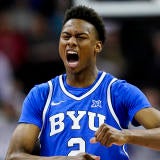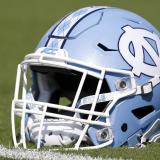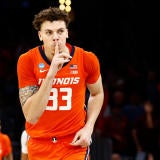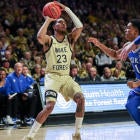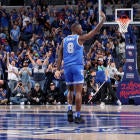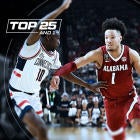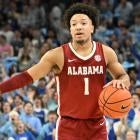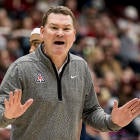The NCAA's notice of allegations that was sent to Kansas on Monday reverberated loudly around the sport. It was the second publicly known instance this year of the organization's enforcement group levying charges against a prominent men's basketball program, with the charges tied to fallout from the federal government's investigation into nefarious recruiting behavior. (North Carolina State was served in July.)
The five Level I accusations against Kansas sent an unavoidable message: in this new era of NCAA adjudication, no program and no coach are too big to face grave consequences. The enforcement group accused Bill Self and his program of being negligent, at minimum, of severe cheating, all of which ties back to the FBI investigation. Kansas and Self will vigorously fight the charges, but nevertheless the NOA being sent and publicly disclosed stoked the conversation on how much is at stake for the NCAA in the coming months and years with all of its potential punishments and the near-dozen schools likely to be issued NOAs.
So another big school should be coming down the NOA pike in short order, right? After all, one of the highest-ranking NCAA officers, Stan Wilcox, said in June that six schools would be served NOAs in the coming months.
It appears Wilcox, the NCAA's executive vice president of regulatory affairs, was wrong.
Oddly enough, the Committee on Infractions has asked the NCAA's enforcement group to hold off on serving more notices of allegations, as the COI wants to avoid a logjam of cases piling up this fall.
We only know this to be true because The Associated Press obtained a letter -- via a records request -- from a COI board member to NCAA enforcement group vice president Jon Duncan. The letter was part of the documentation surrounding the ongoing NC State investigation and forthcoming COI hearing, which now isn't expected to happen until early 2020.
Though the enforcement bureau and the Committee on Infractions are entirely separate groups, they both work under the umbrella of the NCAA. So it's expected that the enforcement group will listen to the recommendations of the COI.
And that means that schools like Louisville, Arizona, USC, Auburn, Oklahoma State and others should be spared for at least a couple of months. The normal deadlines in place have been suspended, prolonging this process because of the weight and knotted-yet-delicate details of the cases.
If the request is granted as expected, we won't have significant movement again until around Thanksgiving at the earliest.
Here are the details, according to the AP.
In a letter obtained by The Associated Press in a public-records request, infractions committee member Carol Cartwright wrote NCAA vice president of enforcement Jon Duncan last week to say the committee "will not act" on cases until Nov. 20. She also wrote that all "briefing deadlines" are on hold during that time, such as the 90 days schools or individuals have to respond to charges outlined in a Notice of Allegations (NOA).
...
Cartwright's letter states the committee's "preference" is for no additional notices to be filed before Nov. 20, even while acknowledging "more cases will follow in the coming months."
...
Cartwright's letter states it will "apply to all infractions cases connected" to the federal corruption investigation into the sport, which became public in fall 2017. The same deadline stipulations will apply to any related notices issued by the NCAA enforcement staff before Nov. 20, while she will determine "next steps" in pending cases after that date, according to the letter.
Cartwright, the former president of Bowling Green and Kent State universities, wrote the letter as part of an effort to "better manage" the complex cases following the federal criminal case that touches numerous schools including Arizona, Auburn and Louisville.
This increases the chances that some schools that eventually get served notices of allegations will have their cases extend deep into 2020, perhaps extending beyond the start of the 2020-21 season. That could prove problematic for the NCAA in terms of a timeline and public reaction to all of this. What might well happen: some schools and coaches receive punishments for 2020-21, while others won't get their penalties enforced until a season later.
Wilcox knows this isn't ideal.
"The membership, particularly the coaching community, have been frustrated," Wilcox said to CBS Sports in June. "Those cases started 2017? We're now in '19. They want action."
It's astounding that the COI is in this position to begin with. It had two full years -- in fact, the FBI probe going public happened two years ago to the day -- to watch this spectacle play out, move through the federal court system, then receive information piecemeal over the ensuing months. It seems like the COI is too inundated to effectively handle these cases in hunk form, and yet ... what did it expect?
Sure, the COI should want to handle these irrefutably important cases -- potentially watershed, really -- as effectively as possible. But it's not an encouraging signal to see this kind of delay less than five months removed from the federal trials concluding.
So while the eventual NOAs to come will still be a big part of the plot of college basketball's 2019-20 season, they'll serve more as a backdrop to eventual, tangible action more than a year from now.








